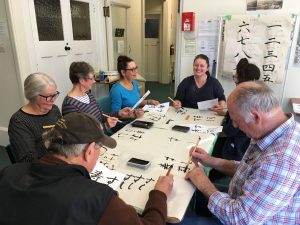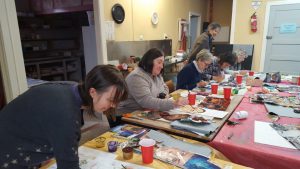An introduction to the WEA
The WEA in NZ stems from the English WEA, inaugurated in March 1903. ln that month, Mrs Frances Mansbridge handed her husband Albert half a crown – all the money in her housekeeping purse – and together they elected themselves founder member and honorary secretary of the “Association to promote the Higher Education of Working Men”. The gender discrimination was corrected two years later, when the name “Workers’ Educational Association” was adopted.
The formative influences in Albert Mansbridge’s life had been the Cooperative Movement, University Extension and the Church of England. He also valued trade unionism; his father and most of their family friends were keen trade unionists. While the first cooperative society had established the tradition of devoting part of its funds to education, the trade union movement had not. Mansbridge’s rationale for basing the WEA largely on the trade union movement was because he believed the best way to contact people was through their own organisations.
A significant contribution of Mansbridge was his insistence on discussion; he was wary of the University tradition of popular lectures. He stated: “Adult education is not merely an appeal to all …. it is not merely for culture in the narrow sense, every legitimate activity of man is material upon which it must work …. Every living person is potentially a student although not necessarily in the technical sense of the word”.
R.H. Tawney, one of the first tutors, described his experience as a tutor as a fellowship with his students, and said, with typical humility, that he owed them much. “The friendly smitings of weavers, potters, miners and engineers have taught me much about the problems of political and economic science which cannot easily be learned from books”.
ln 1913, Mansbridge carried the idea to Australia. The waterside dispute cut short his intended visit to NZ, however. Nevertheless these ideas and philosophy captured the imagination of several people in this country; in Christchurch, Evelyn Willett Cunnington’s enthusiasm was pivotal.
ln 1915 Meredith Atkinson, the first tutor sent from England to Melbourne, and David Stewart, General Secretary of New South Wales WEA, visited NZ for eight weeks. Branches (of the English WEA) were formed in Auckland, Wellington, Christchurch, Dunedin, lnvercargill, Runanga and Taupiri. Unionists, teachers (including University staff), local body politicians and enthusiastic citizens supported inaugural meetings.
By this time the First World War had begun. The Labour Movement here had been split by the radical Federation of Labour and its activities leading up to the waterfront dispute of 1913. The disorganised segments of the Labour leadership were slowly feeling their way to rapprochement. The WEA provided a forum in which they could debate their differing points of view.
There are many incidents and personalities in the story of the WEA in NZ Professor James Shelley’s introduction of the Box Scheme in Canterbury; Norman Richmond’s efforts in Auckland WEA to more fully involve the movement in “education for social change”; withdrawal of Wellington City Council’s support to the WEA because its secretary, A.C. Barrington, was a pacifist; and clashes with the University of New Zealand over economics classes tutored by Rev. J.K. Archer are just a few.
A 1920 Annual Report of the Auckland WEA commented “… Hampered always by lack of funds for organisation and even for teaching, viewed with suspicion, either as a revolutionary propagandised association or as a subsidised agency of the capitalist class, the WEA has steadily adhered to its ideal of education as a process …”. This genuine rejection of party political affiliation is reflected in a recent brochure of the Federation of WEAs “The heart of the WEA lies in its desire to strengthen democracy against authoritarian tendencies.”
FWEA in this country is a member of the lnternational Federation of WEAs (IFWEA), formed in 1947. An association of non-government organisations concerned with workers’ and adult education, it is based on the solidarity and cooperation of its members. One significant framework of the WEA is the lnternational Charter of Workers’ Education adopted by all WEAs in Aotearoa New Zealand. Underlying it is a recognition of the continuing struggle for freedom and dignity, for equality and justice and a recognition that the life of education is inseparable from struggle. Creativity has been a hallmark of WEAs.
Government policy and funding for WEAs came in 1919, and in l92O the Dominion WEA was formalised. lt was funded through the four Colleges of the University of NZ, with WEA districts matching University Districts. Until 1938, when the Council of Adult Education was established with regional advisory councils, it was the only non-institutional education provider. ln 1947 the role of the WEA was challenged by the establishment of Regional Councils of Adult Education, with Departments of Adult Education associated with the University colleges. ln 1963 the Regional Councils were abolished and the National Council of Adult Education (NCAE) established. At that time the Universities became regionally autonomous, and Adult Education departments were integrated into their universities. Funding for WEAs remained channelled through the Universities until 1974, though the relationship between them gradually weakened.
From 1974, WEA funding was channelled through the polytechnic system, until it was cut in 1982. When Government funding restarted in 1985 there was a small grant to the national office, subsequently grants were made to District WEAs. Statutory responsibility for WEAs remained with the NCAE, until that was disestablished in 1990. The Committee for Community Learning (CLANZ), set up from recommendations from the lnterim Advisory Group on Non-Formal Education (IAGNE) after funding to NCAE was cut in 1988, but it has no statutory status. CLANZ lost its advisory role to the Minister in the 1991 Budget, WHEN ALL FUNDING TO WEAs WAS DISCONTINUED. The only other national body with Government funding ($40,000) in our general field, the National Resource Centre for Adult Education and Community Learning, has no statutory advisory function either. This absence of recognition is as critical as the absence of funding. WE NEED YOUR SUPPORT.
Sources of the above information include:
The Early WEA and Education for Social Change, by John Colquhoun
Towards a History of the WEA in NZ, by Roy Shuker
The Beginnings of the WEA, by J.B. Condliffe
Evelyn Willett Cunnington and the Origins of the WEA, by Noel Parsloe
Adult Education ln NZ, by A.B. Thompson
New Zealand Adult Education, by D.W.O. Hall
Structures and Attitudes in N.Z. Adult Education, by Barry Williams
Focus for Adult Learning, by J.C.Dakin.
Authored by Katherine Peet – for WEA Manual
July 1995


